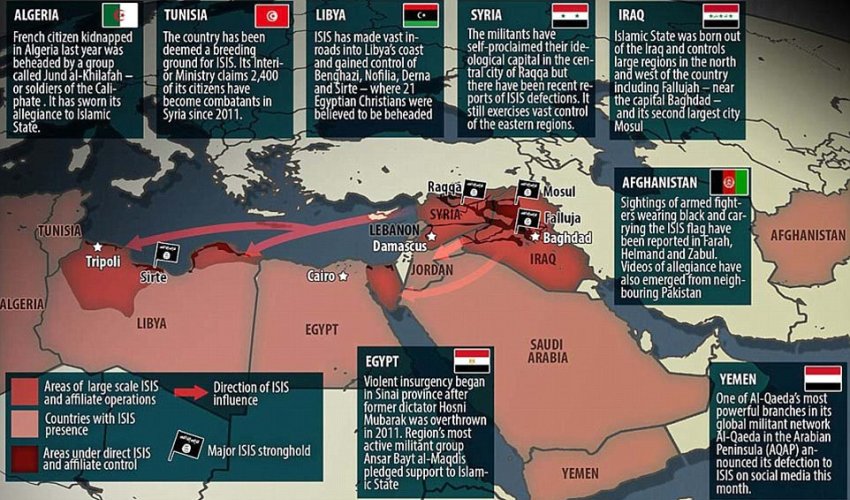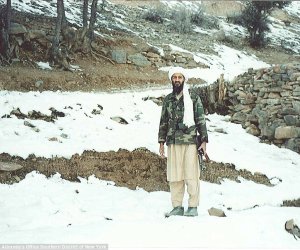The terrifying rise of ISIS

Born out of the Iraqi War in 2003, Islamic State's deadly grip has stretched across the Middle East and into northern-Africa where today, only the Mediterranean Sea separates the militants from Europe.
It has conquered regions of Iraq, Syria and recently Libya while building a terrifying support structure in Turkey, Yemen, Saudi Arabia, Egypt's Sinai Province, Afghanistan, Tunisia and Algeria.
And this tyrannical expansion is all part of its 'global strategy' to seize control of destablised countries while 'engaging in all-out battle against the West,' The Institute for the Study of War told MailOnline.
Counter-terrorism analyst Harleen Gambhir said: 'What we've started to see is ISIS has begun to accelerate its operation to activate these sleeper groups that its reaching out to and it's having international effects.'
The vastness of its influence went largely unnoticed among the wider public until Sunday when it released a gruesome video showing the beheadings of 21 Egyptian Christians on a Libyan beach.
The country's proximity to Europe and its role as a 'hub' for radicalism now poses a 'disaster scenario' according to Middle East and Africa legal consultants Perim Associates.
Its Chief Executive Ethan Chorin told MailOnline: 'There is real concern that dynamics in Libya could destabilise neighboring states like Algeria which, like Egypt, has had a long and particularly violent battle with extremism.
'Radicals from neighboring countries have been using Libya as a refuge and a base for operations against their home countries.'
ISIS commands 31,500 loyal fighters according to the CIA but a commander of the Kurdish fighters who battled the extremists told the Independent on Sunday that they number closer to 200,000.
Its growth in power and territory has been staggering since 2004 when it was known as Al-Qaeda in Iraq (AQI).
The group played a prominent role in the violent insurgency against the US and British occupation of Iraq after toppling Saddam Hussein's rule in 2003.
After a string of bombings and murders over the next two years, its membership grew to around 1,000 according to the Washington Monthly.
AQI then merged with its Mujahideen Shura Council allies in October 2006 to form the Islamic State of Iraq (ISI).
During the Iraq War which took place between 2006 and 2008, ISI had strongholds in Mosul, Baghdad, Al-Anbar and Diyala and commanded between 1,000 and 2,500 soldiers by late 2012.
When it expanded into Syria in April 2013, it finally transformed into the Islamic State of Iraq in Syria (ISIS) as it exists today.
Islamic State has now self-proclaimed the Syrian city of Raqqa as its capital, although there have been reports of increased defections.
(dailymail.co.uk)
ANN.Az
Similar news
Similar news




































 Photo
Photo 



 Video
Video 

